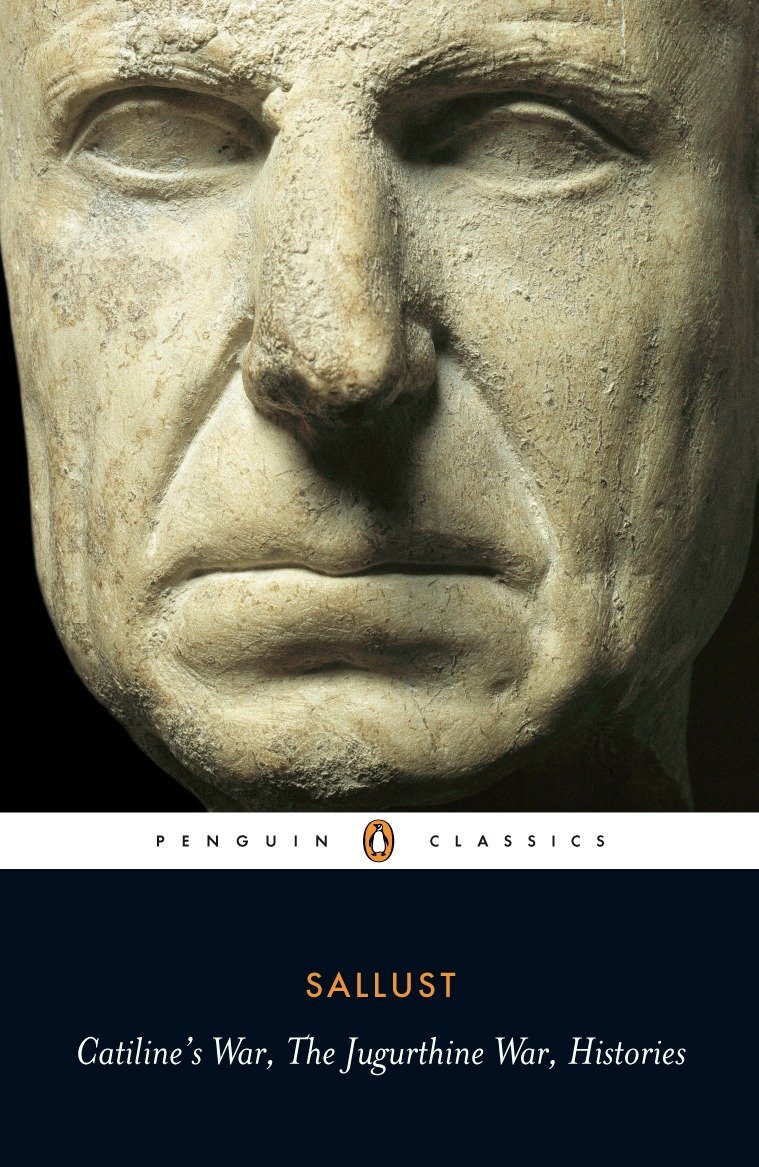Catiline’s War, The Jugurthine War, Histories (Penguin Classics)
£9.20£10.40 (-12%)
Sallust (86–c. 35 bc) is the earliest Roman historian of whom complete works survive, a senator of the Roman Republic and younger contemporary of Cicero, Pompey and Julius Caesar. His Catiline’s War tells of the conspiracy in 63 bc led by L. Sergius Catilina, who plotted to assassinate numerous senators and take control of the government, but was thwarted by Cicero. Sallust’s vivid account of Roman public life shows a Republic in decline, prey to moral corruption and internal strife. In The Jugurthine War he describes Rome’s fight in Africa against the king of the Numidians from 111 to 105 bc, and provides a damning picture of the Roman aristocracy. Also included in this volume are the major surviving extracts from Sallust’s now fragmentary Histories, depicting Rome after the death of the dictator Sulla.
Read more
Additional information
| Publisher | Penguin Classics (6 Dec. 2007) |
|---|---|
| Language | English |
| Paperback | 256 pages |
| ISBN-10 | 9780140449488 |
| ISBN-13 | 978-0140449488 |
| Dimensions | 13.08 x 1.52 x 19.81 cm |










by Amazon Customer
Item exactly as described and sent promptly, I would buy again from this seller.
by George Gordon
The other reviews adequately cover most aspects of this book: this is just to flag a quite extraordinarily irritating feature of the translation, which is that – almost invariably – ‘virtus’ is translated as ‘prowess’. This frequently makes little sense. Whereas in Latin ‘virtus’ is usually a self-evident concept needing no expansion, in English ‘prowess’ is almost always qualified by an explanation of what someone shows prowess at doing.
The result is that every time the native English reader comes across the dreaded ‘p’ word (and virtus is a central concept in Sallust) the gears of the translation crunch and you will wish you were reading a different one.
A great pity. Not so bad in most other respects…
by eleanor
Studying this text in my U3A Latin class, very glad to have a good translation to hand
by rob crawford
Here I am, re-reading books I still have from college, with faint hope that anyone would ever read a review of it, but here goes:
The two tales in this were hugely influential historical essays more or less up to the early 20C; they served as models of moralistic writing as well as clear exposition in Latin. In the Jugurthine War, you get wonderful details on the rise of the great generals, Marius and Sulla, who were friends and then deadly rivals in a struggle that essentially sowed the seeds of the end of the Roman Republic in the next generation.
While the plot covers a war in Northern Africa on a ruthless rebel King, Jugurtha, the most important aspects of the work are on the transformation of the Roman army from amateur farmer landowners to a professional corps that admitted anyone. While a necessity to maintain the expansion of the Roman empire as the population of traditional army recruits dwindled, this led directly to rise of powerful generals, who could rely on the personal loyalty of their troops to grab power in civil war, which had been avoided for centuries. First, there was Sulla’s dictatorship, then Julius Caesar. But the story takes place before that, when the military genius Marius was transforming the army and mentoring the ambitious Sulla. The reader can study the organization of the army as well as the changing mores of Roman society that this reflected. It is a great masterpiece and fun read, with wonderfully quirky details. In many ways, it is about the end of the aristocratic oligarchy that ruled the Republic for so long, as exemplified by the failure of Metellus and how Marius, who was not a aristocrat and knew no Greek, took over from him and triumphed.
The story on Cataline’s conspiracy is more about Rome’s civil society and governance. It is a far more openly moralistic tale of an attempted coup by a disgraced aristocrat, who was opposed by Cicero; in the background Julius Caesar and Pompey are also present, as are a number of lesser known Senators such as Scaurus. While this adds crucial detail to the historical picture, its preachiness and one-sided portrait – and many sloppy mistakes – make it a fairly boring read, i.e. for scholars. It is a tale of decadence and ruffians who are tempted by power in the promises of a fool, Cataline.
So, while rather recondite, this is a truly great volume of one of antiquity’s most influential writers. Recommended.
by Terry Byrne
Knowing the esteem in which Sallust is held by several formidable literary figures (by Tacitus & Nietzsche to name two) I was eager to read him. I sampled the new penguin edition but was not happy with it. I therefore purchased the widely cherished translation by S. A. Handforth. I am glad I did so. It demonstrates Sallust’s stylistic gifts in all their glory. The grand speeches, of course, (by Memmius in ‘Jugurthine War’; by Caesar in ‘Catiline conspiracy’) are the highlights for their thrilling language. Also, Marius’ stirring speech in ‘Jugurthine’ and the whole of Chapter 1 of ‘Catiline’ contain splendid sentences. I highly recommend the Handforth excellent translation. You will not be disappointed.
by Luc REYNAERT
In these biting texts Sallust lays bare the real purpose of the political (national and international) and social scheming of the Roman elites, together with in depth personal portraits (Jugurtha, Sulla), a dark picture of the war scene and an outspoken vision on the nature of mankind. His remarkable analyses are still very relevant today.
Mankind
For Sallust, `false is the complaint that the human nature is weak and ruled by chance. It is the mind which is the leader and the commander of life. When it proceeds along the path of prowess, it does not need fortune. But, if the mind has been taken captive by perverse desires (and) when strength and intellect have ebbed away, those responsible transfer the blame from themselves to `events’.’
Rome
As Jugurtha characterized it mercilessly, Rome `was a city for sale and soon to be doomed – if only it found a buyer.’
National politics (the few and the many)
For Sallust, the many have been the plaything of the haughty few. The conduct of war and of domestic matter (the laws, the courts, the treasury, the provinces) rested solely in their hands. They flaunted `their priesthoods and consulships, and some their triumphs, as if these possessions were an honor, not plunder. Who are those who have taken the commonwealth? The most criminal of beings with gory hands and monstrous avarice, for whom loyalty, dignity, devotion and everything honorable and dishonorable is a source of profit.’
With Sulla, all the power of the few fell in the hands of one man.
International policies
In a letter in the name of Mithridates, Sallust lambasts the Romans to be `the world’s bandits’, having `only a single reason for making war on all nations, peoples and kings: a profound desire for empire and for riches.’ He reminds them that they were `themselves former migrants without fatherland’. Now, they `are prevented by nothing human or divine from looting and destroying allies and friends, peoples distant and nearby and from regarding everything which is not subservient as their enemy. (They) keep their arms directed at everyone, the sharpest against those, when conquered, who afford the greatest spoils. It is by seeding wars from wars, that they have been great.’
The terrible war scene
The barbarous internecine battles for political power ended in ghastly horror scenes: `As for the many who had emerged from the camps for the purposes of viewing or plundering and were turning on the many corpses, some discovered a friend, other a guest or a relative.’
But there is more, `meanwhile the parents or small children of every soldier, whose neighbor was more powerful, were driven from their abode. So avarice accompanied by powerfulness attacked without limit or restraint, it tarnished and devastated everything.’
Sallust wrote a damning verdict of the Roman builders and exploiters of an empire. They killed relentlessly all those blocking their way to unlimited power and riches, enslaved whole populations and, if necessary, committed genocides. Sallust published his most outspoken violent condemnations in his nearly fully lost masterpiece (R. Syme) `Histories’.
Sallust’s texts are brilliantly translated by Anthony J. Woodman, a formidable authority in matters of Latin classical texts (see his introduction and comments).
These texts are a must read for all those interested in the `real’ history of Rome and of mankind.